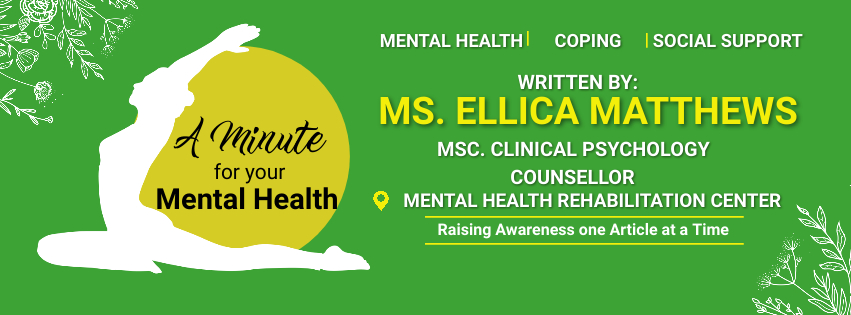
Stigma and by extension discrimination are very important topics when talking about Mental Illness, as they are very present in our community.
To decrease discrimination, we have to normalize having open and honest conversations about Mental Health. Let us as a community all work towards decreasing stigma and discrimination as it relates to Mental Illness, through knowledge and education here in St. Vincent and the Grenadines.
As it relates to Mental Illness, stigma happens when someone perceives you in a negative way because of your mental illness and discrimination occurs when someone treats you in a negative way because of your mental illness. Thus, stigma is a negative stereotype and discrimination is the behavior that results from it. When we as a community engage in acts of stigma and discrimination it can further add stress to an individual who is already experiencing mental health problems and cause that individual’s symptoms to worsen or stop them from getting the help that they need.
As such, this can lead to social isolation, poor housing, unemployment and poverty, which have all been linked to occurring as a result of stigma and discrimination towards those living with mental illnesses. Therefore, stigma and discrimination can trap people in a cycle of illness because persons living with mental illnesses are afraid to get help which can lead to worsening symptoms and in turn, they are not able to productively function within society because of their illness.
In some instances, because it is a mental health related issue people may not receive help for their mental illness. Often, people avoid or delay seeking treatment due to concerns about being treated differently or fears of losing their jobs and livelihood. This often occurs because stigma, prejudice and discrimination against people with mental illness is still prominent within our society.
If you would like to play an active role in decreasing stigma and discrimination within your community, here are some suggestions about what we can do as individuals to help reduce the stigma of mental illness:
Talk openly about mental health, like we are doing with these articles; it can be done in your family circles, social groups or via social media.
Educate yourself and others – respond to misconceptions or negative comments by sharing facts and experiences.
Be conscious of language – remind people that words matter. The word crazy is a derogatory term, let us start using the phase mentally ill.
Encourage equality between physical and mental illness – draw comparisons to how they would treat someone with cancer or diabetes.
Show compassion for those with mental illness.
Be honest about treatment – normalize mental health treatment, just like other health care treatment.
Let the media know when they are using stigmatizing language when presenting stories of mental illness.
If you have a mental illness choose empowerment over shame – Tell yourself I might fight stigma by choosing to live an empowered life, that means owning my life and my story and refusing to allow others to dictate how I view myself or how I feel about myself.
Sharing your own experience of mental illness. We know not every experience may have been a positive one but let us normalize having the conversation. This will help dispel myths and encourage others to do the same. Mental illness is not something shameful that needs to be hidden.
Mental Health, just like physical health is a shared responsibility. Let us all do our small part in ensuring that persons do not feel like they are not worth getting the necessary mental health interventions.
Written by:
Ms. Ellica Matthews
MSc. Clinical Psychology
